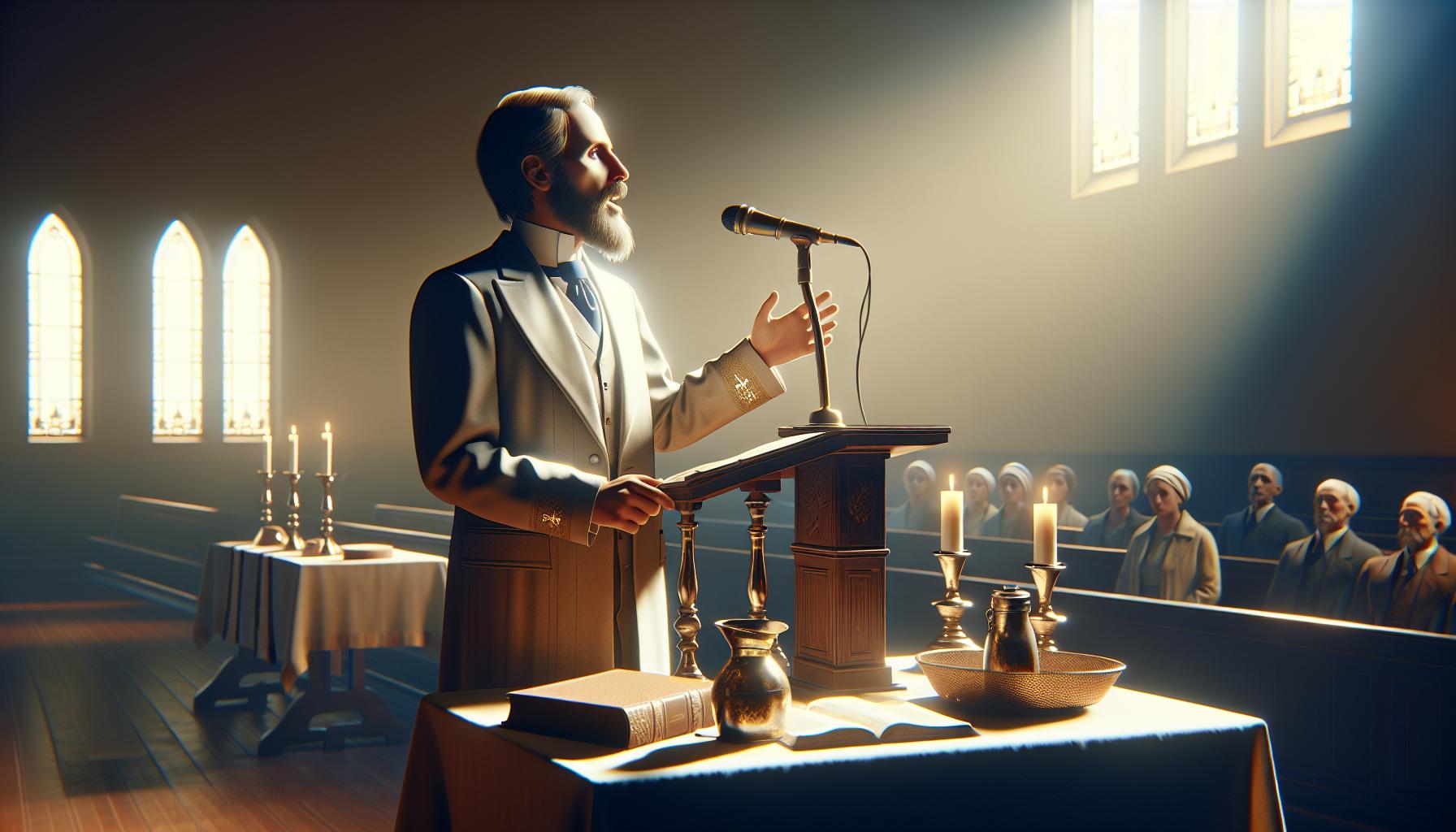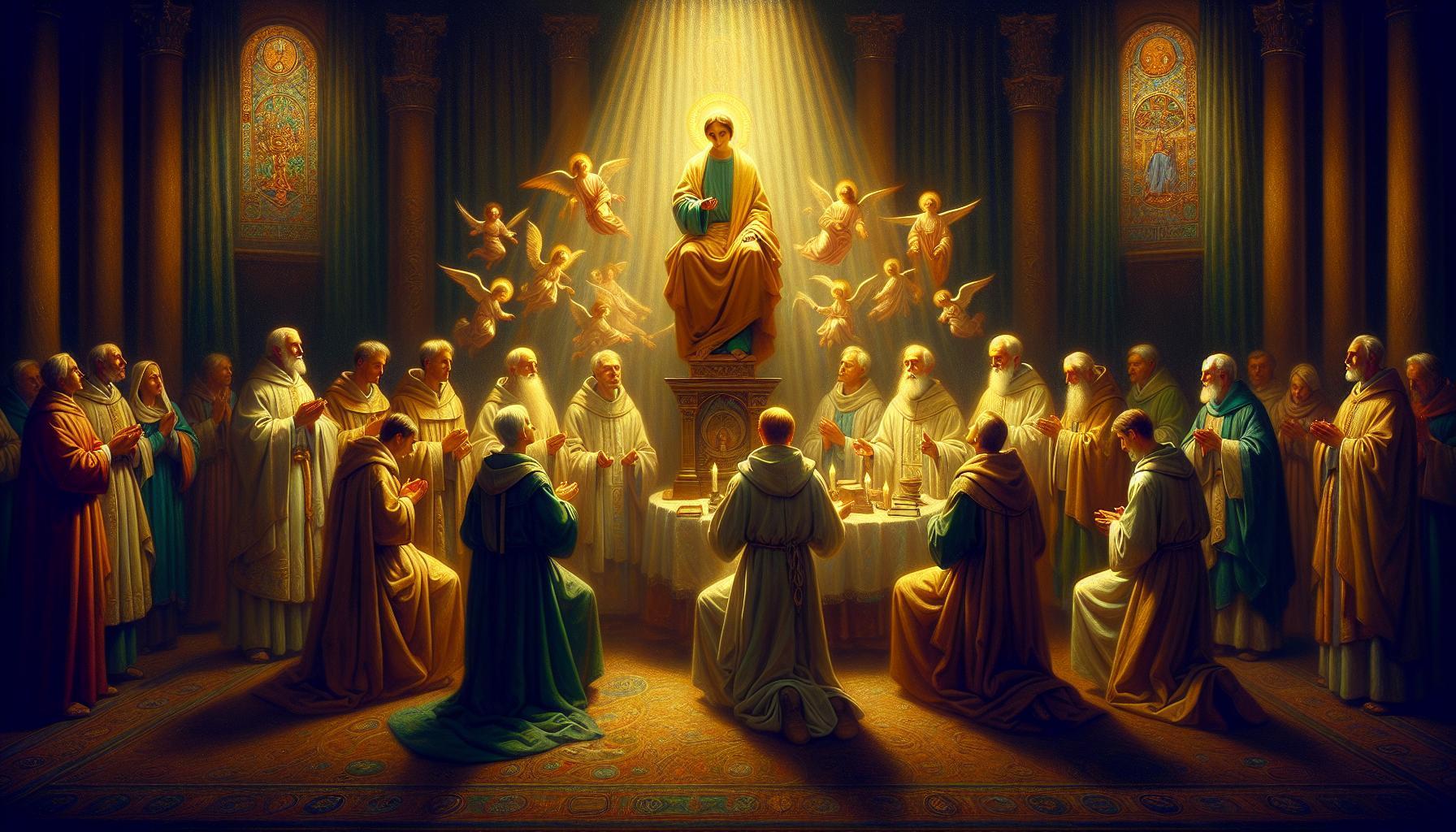Did Martin Luther King Jr. transcend the role of a preacher to become a revolutionary figure in the fight for justice? His sermons were not only religious proclamations but powerful calls for social change that inspired millions. Understanding King’s dual identity as both a spiritual leader and social activist reveals the profound impact of his legacy on civil rights and today’s ongoing struggles for equality.
The Roots of Martin Luther King’s Preaching: A Theological Foundation
Martin Luther King Jr.’s profound influence as a preacher was deeply rooted in a rich theological foundation that shaped his understanding of justice, love, and humanity. His sermons were not just spiritual exhortations; they were powerful calls to action grounded in his interpretation of Christian doctrine and the broader social context of his time. King’s educational background, particularly in theology, equipped him with the tools to articulate a vision of social justice that resonated with diverse audiences. His ability to weave together biblical stories and contemporary struggles created a compelling narrative that mobilized people toward activism.
Theological Foundations
King’s preaching was heavily influenced by the Civil Rights Movement’s ethical framework, which emphasized the inherent value of human dignity and the necessity of nonviolent resistance. He drew inspiration from several theological sources:
- Christian Ethics: King maintained that moral laws, as interpreted through the teachings of Jesus, demanded equality and justice for all people.
- Social Gospel: This movement emphasized the application of Christian ethics to social problems, advocating for systemic change to alleviate poverty and discrimination.
- Pacifism and Nonviolence: Influenced by Mahatma Gandhi, King argued that love and nonviolent protest were the most potent tools for achieving social justice.
His sermons such as “But if Not,” delivered at Ebenezer Baptist Church, exemplified his ability to address existential questions while motivating listeners to act in faith despite the struggles they faced[[1]](https://www.youtube.com/watch?v=pOjpaIO2seY). King’s theological reflections were transformative, inviting individuals to confront not only their injustices but also to embody the radical love that Jesus preached.
Legacy of Justice Through Sermons
King’s legacy embodies the intersection of sermon and social action, where preaching served as a catalyst for collective movement. His works propelled faith communities into the public square, prompting many to ask: *How can we live out our faith in advocating for justice?* Sermons like “I’ve Been to the Mountaintop” famously articulated the need for commitment to the struggle for equality while invoking a vision of a promised land—one where all people would be free and equal[[3]](https://crossculturalsolidarity.com/mlk-speeches-sermons-essays/).
In conclusion, understanding the roots of Martin Luther King’s preaching allows us to appreciate how theological foundations can inspire comprehensive social change. His example encourages contemporary activists to draw from their beliefs to engage in justice work, illustrating that faith and activism are intertwined in the pursuit of a more equitable society. Emphasizing the action-oriented legacy of his sermons, it is evident that they continue to inspire new generations to advocate for justice rooted in love and faith.
Sermons that Shaped a Movement: The Power of King’s Rhetoric
The effectiveness of Martin Luther King Jr.’s rhetoric can be traced back to the power and passion found in his sermons, which served as a vital tool for mobilizing the civil rights movement. King’s ability to weave biblical references and poetic rhythms into his speeches resonated deeply with his audience, captivating hearts and minds with messages of hope and justice. His sermons were not only religious orations but also calls to action, urging individuals to confront social injustice through love, nonviolence, and communal responsibility. The artful combination of scripture and social critique in his preaching created a unique homiletic style that galvanized a diverse following, transforming passive listeners into ardent advocates.
The Craft of Homiletical Aesthetics
King’s sermons embodied a rich tradition of African American preaching that emphasized the beauty of language, rhythm, and emotional appeal. This stylistic approach played a crucial role in how he communicated his vision of equality and justice. In his sermon titled “The Drum Major Instinct,” for instance, King employed a narrative structure that highlighted the moral imperative of service over self-importance. His rhetorical choices were deliberate, designed to stir both introspection and determination in his audience. By engaging them intellectually and emotionally, King inspired a sense of urgency and collective purpose that was instrumental in advancing the civil rights agenda.
Legacy of King’s Rhetoric in Contemporary Activism
The rhetorical legacy of Martin Luther King Jr. is evident in today’s movements for social change, where effective communication remains a cornerstone of advocacy. Modern activists draw inspiration from King’s call for justice and his commitment to nonviolent resistance. His sermons illustrate invaluable lessons for contemporary leaders, particularly the importance of connecting with an audience on spiritual and ethical levels. Practical steps to emulate King’s approach include:
- Emphasizing Storytelling: Share personal narratives that illustrate larger social issues, making them relatable and impactful.
- Utilizing Symbolism: Incorporate powerful symbols that resonate with both the history and aspirations of the community.
- Fostering Inclusivity: Create a message that invites everyone to participate in the fight for justice, reinforcing the idea that the struggle belongs to us all.
King’s sermons exemplify how religious and moral dimensions can inform public discourse, serving as a powerful reminder of the role that passionate, articulate communication plays in shaping movements. Those who follow in his footsteps can harness this potent rhetorical style to ignite change and uplift communities in the contemporary context.
Bridging Faith and Justice: King’s Vision for Social Change
In a world often divided by racial, socioeconomic, and ideological lines, Martin Luther King Jr. stands as a beacon of hope and resilience, bridging the gap between faith and justice. His journey exemplifies how spiritual conviction can fuel social change, creating a powerful framework for advocacy that resonates deeply in today’s context. King’s approach was unique; he did not merely preach from a pulpit but actively engaged in the fight for civil rights, drawing on his Christian beliefs to inspire collective action.
Faith as the Foundation for Social Justice
King’s profound understanding of Christianity was evident in his speeches and writings, where he articulated a vision of justice rooted in love, compassion, and equality. He believed that true faith compels individuals to work towards alleviating suffering and promoting justice. This theological commitment is exemplified in his famous assertion that “injustice anywhere is a threat to justice everywhere.” By intertwining religious conviction with the struggle for civil rights, King emphasized that the quest for justice should be a communal endeavor, anchored in shared values of dignity and humanity.
- Strategic Nonviolence: Inspired by Mahatma Gandhi, King advocated for nonviolent resistance as a means to enact social change. This strategy effectively mobilized diverse groups and drew public attention to the injustices faced by African Americans.
- Mobilizing Communities: Faith communities played a crucial role in the civil rights movement. Churches served as meeting places and organizing centers, harnessing the power of collective faith to inspire action.
- Historic Sermons: King’s sermons were transformative, often blending biblical references with urgent calls for social action. His “I Have a Dream” speech remains a powerful example of utilizing faith to envision a just future.
Examples of Actionable Steps Inspired by King’s Legacy
To carry forward King’s vision of bridging faith and justice, individuals and communities can adopt several practical approaches:
| Action | Description |
|---|---|
| Engage in Dialogue | Facilitate discussions within faith communities about social justice issues, exploring how beliefs can inform action. |
| Volunteer | Participate in local initiatives aimed at addressing social inequalities, such as food banks or educational programs. |
| Advocate for Policy Change | Use your voice in advocacy for policies that promote equity and justice, drawing on theological frameworks that support these efforts. |
By understanding Martin Luther King Jr.’s legacy as intrinsically linked to his role as a preacher, it becomes clear that the power of faith transcends the walls of a church, propelling believers into the realm of social justice. This synthesis of sermon and action not only honors his contributions but also inspires a new generation to embrace the call to justice, ensuring that faith and activism continue to intersect in meaningful ways.
The Legacy of Nonviolence: Lessons from King’s Sermons
The teachings of Martin Luther King Jr. are not only a cornerstone of American civil rights but also a profound legacy of nonviolence that remains relevant today. King’s sermons often embodied the principles of nonviolent resistance, which he believed was a powerful antidote to hate and injustice. His approach was rooted in deep spiritual convictions and aimed at fostering a society built on love, understanding, and forgiveness. King illustrated how nonviolence is more than just the absence of conflict; it is an active stance against oppression that challenges systems of evil through deep moral courage.
Core Lessons from King’s Sermons
In his sermons, Martin Luther King Jr. emphasized several key lessons that can still inspire contemporary movements for justice and equality. These lessons include:
- Love as a Force for Change: King taught that love is a transformative power that can heal divisions, a theme echoed in many of his sermons. He proclaimed that hate cannot drive out hate; only love can do that. This lesson encourages modern activists to embrace empathy rather than hostility.
- The Importance of Community: King often highlighted the necessity of collective action in the pursuit of justice. He believed that individual efforts must be supported by a united front, demonstrating that change is more effective when fueled by community solidarity.
- Faith in Action: King’s sermons were steeped in the belief that faith must translate into action. He inspired followers to take active roles in advocating for civil rights, suggesting that faith without works is dead.
- Courage to Confront Evil: Central to his philosophy was the idea of courageous confrontation of injustice. King encouraged individuals to face systemic evil with love and resolve, framing struggle as a noble and necessary endeavor.
Practical Applications of Nonviolent Principles
Applying King’s nonviolent teachings can reshape modern approaches to social justice. Activists today can find value in these principles through concrete steps, such as:
- Engaging in Dialogue: Host town hall meetings to discuss community grievances, fostering a spirit of open communication.
- Organizing Peaceful Protests: Plan demonstrations that reflect King’s commitment to peaceful protest, ensuring they are inclusive and focused on a message of hope.
- Building Coalitions: Collaborate with a diverse array of groups to strengthen community ties and broaden support for social justice initiatives.
- Practicing Active Nonviolence: Encourage daily acts of kindness and understanding among individuals from different backgrounds, creating a culture of respect and safety.
By incorporating these practices and insights into today’s movements, we honor not just the legacy of King as a preacher and leader but commit to a future grounded in the values of love, justice, and solidarity. The lessons from his sermons continue to resonate, urging us to confront injustice not only with passion but with a steadfast commitment to nonviolent principles.
Engaging Communities through Preaching: King’s Model for Inclusivity
Engaging communities through preaching has, historically, been a powerful tool for fostering inclusivity and social change. Martin Luther King Jr. exemplified this through his sermons, which were not merely religious speeches but also compelling calls to action for justice, community, and unity across diverse populations. His unique ability to connect with audiences came from a profound understanding of the social issues of his time, and he used this platform to engage not only his congregants but also broader society.
One of King’s key strategies was the integration of personal stories that reflected collective experiences. This approach created a sense of shared identity and purpose, making his messages resonate deeply with varied audiences. He emphasized the notion that everyone, regardless of background, could contribute to the fight for justice and equality. Whether addressing issues of racial discrimination, poverty, or war, King’s sermons urged individuals to see beyond their differences and to embrace their shared humanity. His famous sermon “Loving Your Enemies,” for example, illustrates this ethos with a strong message about understanding and empathy, fostering community ties even among those with opposing views [[2]].
A Model for Inclusivity
King’s approach included practical steps for achieving inclusivity within communities. He promoted active engagement through service, advocating for individuals to participate in social justice initiatives that directly impacted their neighborhoods. This hands-on involvement not only empowered individuals but also laid the groundwork for building coalitions across various demographics. In his speeches, such as those delivered during the Selma to Montgomery marches, King championed the idea that unity in purpose, regardless of race or socio-economic status, was essential for progress [[1]].
To implement strategies similar to King’s, modern leaders can adopt the following practices:
- Encourage Dialogue: Create forums where community members can share their experiences and perspectives, fostering understanding and collaboration.
- Highlight Common Goals: Focus on shared values and objectives to unite diverse groups in pursuit of common outcomes.
- Promote Inclusivity in Leadership: Ensure that all voices are represented in decision-making processes, reflecting the rich diversity of the community.
- Lead by Example: Demonstrate commitment to social justice through personal actions and community involvement, inspiring others to follow suit.
By embracing these principles reminiscent of King’s teachings—principles that underscore his legacy as a preacher and a champion of social justice—leaders today can strengthen community ties and tackle contemporary challenges with a united front.
The Role of Spirituality in King’s Activism: A Journey of Hope
Martin Luther King Jr. stands as a monumental figure in the landscape of activism, not solely due to his strategic approaches but also because of the profound spiritual roots that fueled his journey. In examining the intersection of spirituality and activism, it is clear that King’s deep faith provided him with a unique framework through which he viewed the struggles for civil rights and social justice. His sermons and speeches resonate with themes of love, justice, and peace, drawing heavily from his understanding of Christian doctrine and the moral imperatives that emerged from it.
King harnessed spirituality as a powerful motivator, believing that true change could only emerge from a foundation of love and forgiveness. He famously stated, “Darkness cannot drive out darkness; only light can do that. Hate cannot drive out hate; only love can do that.” This belief in the transformative power of love underpinned his philosophy of nonviolent protest and civil disobedience, positioning spirituality not just as a personal compass, but as a communal call to action. His sermons often encapsulated this message, urging listeners to transcend their grievances and unite in the pursuit of justice through compassionate engagement.
Spiritual Foundations of Activism
King’s activism was deeply rooted in several core spiritual tenets that shaped his approach to civil rights. These include:
- Faith in Action: King believed that faith was not only a personal journey but also a catalyst for social action. He saw the struggle for civil rights as an extension of his religious duty.
- Moral Responsibility: The concept of a moral imperative to fight against injustice was central to King’s sermons. He positioned the fight for civil rights as a divine calling.
- Community and Solidarity: Spirituality in King’s vision emphasized the importance of collective action, fostering a sense of community and shared purpose among activists.
By interweaving his spiritual beliefs with his activism, King was able to inspire others not just through rhetoric but through a vision that echoed the ethical dimensions of love and justice. His legacy serves as a powerful reminder that spirituality can be a formidable force in social movements, offering both a guiding principle and a means of sustaining hope in the face of adversity.
Ultimately, by understanding King’s spiritual approach—what can be encapsulated in the question “Was Martin Luther King a Preacher? Legacy of Sermon and Justice”—we recognize that his profound faith was not merely a backdrop to his activism; it was integral to his message and mission. As we explore his legacy, it’s vital to consider how this blend of spirituality and activism continues to resonate in contemporary movements for justice and equality, encouraging us to remain hopeful and engaged in our own journeys of change.
Transformative Theology: How King’s Faith Inspired Action
Martin Luther King Jr.’s profound faith was not solely a matter of personal belief; it was the driving force behind his activism and the impetus for transformative social change. His theological perspective, deeply rooted in his Christian faith, provided a framework through which he interpreted the world and envisioned justice. King utilized his sermons as powerful vehicles for inspiring action, appealing not just to shared values but also to a higher moral calling that transcended racial and social barriers. This integration of faith and activism is emblematic of his legacy.
King’s vision of justice was fundamentally connected to his understanding of God and humanity. He often articulated a conception of a loving and just God, one who champions the oppressed and calls individuals to act on behalf of justice. In his doctoral dissertation, King explored various theological perspectives, notably those of Paul Tillich and Henry Nelson Wieman, which enriched his understanding of God as personal and relational, rather than abstract. This theological foundation inspired his belief in nonviolence and civil disobedience as moral imperatives, anchored in a commitment to peace and reconciliation.
The Role of Community in King’s Theology
Central to King’s transformative theology was the concept of community. He believed that faith was best expressed through collective action and solidarity. In his famous “Letter from Birmingham Jail,” King emphasized the interconnectedness of all people, stating, “Injustice anywhere is a threat to justice everywhere.” This belief galvanized a movement that linked the African American struggle for civil rights to broader human rights issues, promoting a vision of unity that transcended race, class, and geography.
- Faith as a Catalyst: King viewed faith as a catalyst for change, urging individuals to reflect on their moral responsibilities.
- Nonviolent Resistance: His commitment to nonviolence was a direct manifestation of his theological convictions, drawing from the teachings of Jesus and the principle of agape love.
- Empowerment through Action: King’s sermons empowered ordinary individuals to take active roles in the pursuit of justice, encouraging grassroots mobilization.
This transformative approach not only provided solace during times of distress but also energized movements for civil rights, demonstrating how a faith-driven vision can inspire collective action. The legacy of King as a preacher and leader is a testament to the effectiveness of infusing theological principles with social activism, illustrating the profound impact that faith can have in striving for justice and equality. King’s life and work provoke essential questions about our own ethical responsibilities and how we can embody a commitment to justice in our communities today.
From the Pulpit to the Public Square: The Impact of King’s Message
The powerful oratory of Martin Luther King Jr. transcended the walls of the church and resonated within the public sphere, creating an indelible impact on the Civil Rights Movement and American society at large. As a preacher, King harnessed the profound ability to weave spiritual truths with urgent social justice messages, igniting hope and mobilizing countless individuals to take up the cause for racial equality. His sermons were not merely religious lectures; they served as calls to action, urging his congregations and supporters to envision a world free from oppression.
Transformative Sermons as Tools of Justice
King’s approach exemplified how the pulpit can act as a platform for social change. His “I Have a Dream” speech, delivered during the March on Washington in 1963, is a prime example of how his message of non-violence and unity galvanized the movement. By integrating theological reflections with the lived realities of African Americans, King conveyed not only the moral urgency of the struggle but also a vision for a more equitable future. These sermons combined passionate rhetoric with profound moral implications, illustrated by the repeated calls for love and understanding amidst deep societal divides.
- Faith as a Catalyst: His faith provided a moral framework that inspired action, as seen in his belief that love could counteract hate.
- Unity in Diversity: King frequently emphasized the beauty and strength in diversity, fostering a sense of community that crossed racial lines.
- Visionary Leadership: He articulated a compelling vision not just for his congregation but for the entire nation, appealing to a higher truth beyond societal injustices.
Legacy Beyond the Sermon
The legacy of King’s preaching extends beyond his time; it continues to inspire movements for justice today. His life’s work illustrates that sermons can evolve into blueprints for societal change. Modern leaders can draw from his example by using their platforms—be it in churches, community centers, or social media—to advocate for justice and equality. Practical steps include organizing local workshops or discussion groups that tackle contemporary issues through the lens of moral and ethical teachings, nurturing a community of engaged citizens who carry on King’s vision.
| Sermon Aspect | Impact on Social Justice | Modern Application |
|---|---|---|
| Moral Authority | Establishes legitimacy in advocating for change | Utilizing ethical teachings to address modern dilemmas |
| Community Engagement | Fosters solidarity among diverse groups | Encouraging interfaith dialogues and actions |
| Visionary Messaging | Mobilizes movements toward a common aim | Creating inclusive visions for community-led initiatives |
By exploring the intersection of faith and activism, “Was Martin Luther King a Preacher? Legacy of Sermon and Justice” provides insights on how King’s teachings remain relevant today. As new generations grapple with injustices, the principles articulated in his sermons can illuminate paths forward, underscoring the enduring power of the pulpit as a force for societal transformation.
FAQ
Was Martin Luther King a preacher?
Yes, Martin Luther King Jr. was a preacher and an influential civil rights leader. He served as a Baptist minister and used his platform to advocate for justice and equality through powerful sermons.
King’s sermons often focused on themes of love, justice, and non-violence. His religious beliefs profoundly shaped his activism, urging his followers to embrace peaceful resistance against oppression. His sermons, such as “I Have a Dream,” resonate today as foundational texts in civil rights discussions.
What was the legacy of Martin Luther King’s sermons?
The legacy of Martin Luther King Jr.’s sermons is profound, inspiring movements for justice and equality. His words continue to motivate activists and inspire social change both in the U.S. and worldwide.
King’s ability to merge spiritual faith with civil rights initiatives created a unique platform. His sermons encouraged people to not only fight for their rights but to do so through love and understanding, exemplifying a powerful ministry rooted in justice.
How did King’s preaching influence the civil rights movement?
King’s preaching was instrumental in the civil rights movement, as it mobilized thousands to join the cause. His sermons provided a moral framework that unified the movement’s goals with deep-rooted spiritual values.
By invoking principles of love and non-violence drawn from his Christian faith, King inspired individuals and communities to take action peacefully. His leadership demonstrated the deep connection between faith and social justice, encouraging many to participate actively in the struggle for civil rights.
Can I find recordings of Martin Luther King’s sermons?
Yes, recordings of Martin Luther King Jr.’s sermons are available in various formats, including online archives and documentaries. Many institutions, including libraries and websites dedicated to civil rights history, provide access to these valuable resources.
Listening to his sermons offers insights into his rhetoric and the passionate convictions that guided his activism. Sites such as the King Center and other educational platforms often provide free access to these powerful speeches.
Why do Martin Luther King’s sermons still matter today?
Martin Luther King Jr.’s sermons remain relevant today as they address ongoing issues of inequality and injustice. His messages of hope and resilience resonate with contemporary struggles for civil rights globally.
As movements for social justice continue to flourish, King’s emphasis on love and non-violent resistance serves as a guiding principle. His legacy encourages current and future generations to advocate for their rights with compassion and integrity.
What themes did Martin Luther King focus on in his sermons?
Martin Luther King Jr. focused on several key themes in his sermons, including justice, love, and non-violence. These themes were central to his vision of a just society, linking spiritual beliefs with the practical fight against racial oppression.
His sermons encouraged listeners to strive for a world where every individual is treated with dignity and respect. By emphasizing the importance of community and collective action, King’s messages continue to inspire movements for social change today.
How did King integrate his faith into his activism?
King seamlessly integrated his faith into his activism, seeing his work as a divine calling. He believed that spirituality was essential to the struggle for justice, using his sermons to motivate and guide others.
This integration allowed him to frame civil rights issues within a broader context of moral responsibility, making the case for equality and justice as a human right rooted in Christian love. His approach not only inspired others to join the cause but also helped to build a coalition of diverse faiths committed to social change.
In Conclusion
As we reflect on the powerful legacy of Dr. Martin Luther King Jr., it is essential to recognize his profound role as a preacher and prophet of justice. His sermons, imbued with deep theological insights, were not merely oratory; they were calls to action grounded in a biblical mandate. King’s powerful invocation of Amos 5:24, where he urged for justice to “roll down like waters,” speaks to his commitment to dismantling systemic inequalities and advocating for marginalized communities [1[1].
By bridging the ancient messages of the prophets with the struggles of his time, King exemplified how preaching can inspire social change and invigorate faith communities. His life stands as a testament to the belief that justice is not an abstract ideal but a tangible, ongoing pursuit that each of us is called to engage [2[2].
We invite you to delve deeper into the intersection of faith and justice within your own context. Explore the biblical texts that fueled King’s passion and consider how they resonate in today’s world. Engage with your community, support efforts for equality, and reflect on how you can embody the prophetic spirit of justice in your own preaching and ministry. Together, let us continue to build a legacy of love and righteousness that transcends boundaries and uplifts all.






